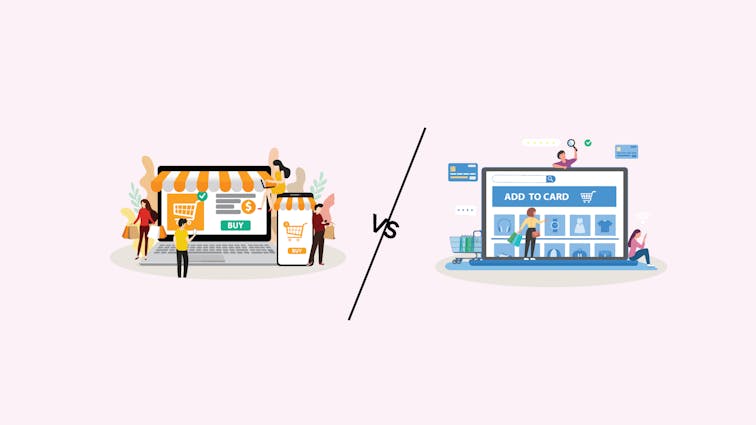
Marketplace vs Website: Choosing What's Best for Your Business
Are you considering taking your business online but are unsure whether to set up your own website or join an existing marketplace?
This is a common dilemma for many entrepreneurs.
Both options have their pros and cons, and the best choice depends on various factors such as your business model, target audience, and marketing strategy.
Let’s dive deeper into this topic and explore the differences between a marketplace and a website.
Understanding Marketplaces

A marketplace, in the context of e-commerce, is an online platform where products or services are sold by multiple third parties, while the marketplace operator processes the transactions.
Examples of popular online marketplaces include Amazon, eBay, and Etsy.
Advantages of Using a Marketplace
- Reach: Marketplaces often have a large established customer base. For instance, as of 2023, Amazon had over 310 million active users. This means that by selling on Amazon, you can potentially reach a vast audience without having to spend heavily on marketing.
- Trust: Customers often trust well-known marketplaces, which can lead to higher conversion rates.
- Ease of Setup: Setting up a shop on a marketplace can be quicker and easier than building a website from scratch. You don’t need to worry about website design, hosting, or payment gateway integration.
- Support Services: Marketplaces usually provide customer support, shipping, or payment services, saving you time on administrative tasks.
- Lower Initial Investment: Marketplaces might charge a transaction fee or monthly fee, but overall less initial capital is required compared to building your own website.
Disadvantages of Using a Marketplace
- Competition: On a marketplace, your product is listed alongside those of your competitors. This can make it harder to stand out.
- Fees: Most marketplaces charge fees for listing and selling products. These fees can eat into your profit margins.
- Lack of Control: When you sell on a marketplace, you have to abide by the platform’s rules and policies, which can change at any time. You also don’t have control over the customer experience or branding.
Understanding Websites (E-commerce platforms)

An e-commerce website is a site that allows you to sell goods and services online.
It’s like having your own online store where you can display your products, set your prices, and manage your inventory.
Some popular e-commerce platforms that can help you set up your online store include Aasaan, Shopify, WooCommerce, and Magento.
Advantages of Using an E-commerce Website
- Control: With your own website, you have complete control over your online store. You can customize the look and feel of your store, decide on the layout, and create a unique shopping experience for your customers.
- Branding: Having your own website allows you to build and reinforce your brand. You can use your logo, company colors, and other branding elements consistently throughout your site.
- Profit Margins: Unlike marketplaces, e-commerce platforms don’t take a cut of your sales. This means you can potentially enjoy higher profit margins.
- SEO: By having your own website, you can implement search engine optimization (SEO) strategies to drive organic traffic to your store from search engines like Google.
- Marketing Flexibility: With your own website, you can employ various marketing tactics such as email marketing, retargeting ads, and content marketing to capture leads and increase sales.
Disadvantages of Using an E-commerce Website
- Traffic: Unlike marketplaces, which have a built-in audience, you’ll need to work to drive traffic to your website. This might involve SEO, paid advertising, social media marketing, and other strategies.
- Trust: Building trust with customers can be more challenging with a new website. Shoppers might be hesitant to buy from a site they’re not familiar with.
- Maintenance: Running a website involves tasks like updating product listings, managing inventory, and handling customer service inquiries. Depending on the size of your business, these tasks can be time-consuming.
Key Differences between Marketplace and Website

When deciding between a marketplace and a website, it’s important to consider several key factors. Let’s take a look at some of the main differences:
1. Traffic and Audience Engagement
Marketplaces often have a large established customer base, which can lead to higher traffic and more potential sales.
However, attracting and engaging this audience can be challenging due to the high level of competition.
On the other hand, while driving traffic to a new website can be challenging, once visitors arrive, you have more opportunities to engage them and build a relationship.
2. Marketing and Brand Recognition
With your own website, you have more freedom to build your brand and market your products as you see fit.
You can use your branding consistently across your site and in your marketing materials.
In contrast, on a marketplace, your branding opportunities are limited, and you’re largely reliant on the marketplace’s marketing efforts.
3. Scalability
If you plan to scale your business, having your own website might be a better option.
You have more control over your site and can adapt it as your business grows.
On a marketplace, you’re subject to the platform’s rules and limitations, which might hinder your growth.
4. Inventory Management
Managing inventory can be easier on a marketplace, as many platforms offer tools to help with this.
However, you might face restrictions on the types of products you can sell.
With your own website, you have complete control over your inventory, but managing it can be more time-consuming.
5. Volume
If you have a large volume of products to sell, a marketplace might be a better option, as it can handle high traffic and transaction volumes.
However, if you sell niche products or have a smaller inventory, a website might be more suitable.
6. Time and Money
Setting up a shop on a marketplace can be quicker and cheaper than building a website. However, marketplace fees can eat into your profits.
Building and maintaining a website requires more time and money upfront, but in the long run, it could be more cost-effective.
Choosing Between a Marketplace and a Website
When choosing between a marketplace and a website, consider the following factors:
- Your Business Model: If you’re selling niche products or offering personalized services, a website might be a better fit. If you’re selling a wide range of products and want to reach a large audience quickly, a marketplace might be more suitable.
- Your Target Audience: Consider where your target audience is likely to shop. If they’re likely to search for your products on a marketplace like Amazon, it might be worth setting up shop there. If they’re more likely to find you through search engines or social media, a website might be a better option.
- Your Marketing Strategy: If you have the resources to invest in SEO, content marketing, and other strategies to drive traffic to your site, a website might be a good choice. If you’d rather leverage the marketing power of an established platform, consider a marketplace.
- Your Branding Strategy: If building a strong, unique brand is important to you, a website will give you more freedom to express your brand identity.
When a Marketplace is More Suitable
A marketplace might be more suitable if:
- You’re a new or small business looking to reach a large audience quickly.
- You have a wide range of products that are commonly searched for on marketplaces.
- You want to take advantage of the trust and credibility of an established platform.
- You’re looking for a low-maintenance option that handles transactions, shipping, and customer service.
When a Website is More Suitable
A website might be more suitable if:
- You’re selling niche products or offering personalized services.
- You want to build a strong, unique brand.
- You’re willing to invest in marketing to drive traffic to your site.
- You want full control over your online store, from the design to the customer experience.
Combining Both Approaches: The Hybrid Model

There’s a third option that many businesses are adopting: the hybrid model.
This involves having your own e-commerce website while also selling on one or more marketplaces.
This approach allows you to enjoy the benefits of both platforms.
Benefits of the Hybrid Model
- Reach and Engagement: You can reach a large audience through the marketplace while also building a loyal customer base on your website.
- Brand Building and Sales: You can use the marketplace for sales while focusing on brand building and customer engagement on your website.
- Risk Diversification: If one platform underperforms, you still have the other to fall back on.
Challenges of the Hybrid Model
- Resource Intensive: Managing multiple platforms can be time-consuming and may require more resources.
- Consistency: Maintaining brand consistency across multiple platforms can be challenging.
Examples of Successful Hybrid Model Businesses
Many businesses have successfully adopted the hybrid model.
For instance, fashion brands like Nike and Under Armour sell on their own websites as well as on marketplaces like Amazon and Zalando.
Case Studies of Success and Failure
Let’s look at some real-world examples of businesses that have succeeded or failed on marketplaces and websites, and what we can learn from them.
Success on Marketplaces
Example: Anker
Anker, a Chinese electronics brand, is a great example of a company that has found immense success on Amazon.
They focused on creating high-quality, affordable alternatives to big-name electronics and used Amazon’s customer reviews to build trust.
Strategies for Marketplace Success
- Focus on customer service to earn positive reviews.
- Offer competitive pricing.
- Use high-quality product images and detailed descriptions.
Success with Websites
Example: Gymshark
Gymshark, a fitness apparel and accessories brand, is a prime example of website success.
They built a strong brand through influencer marketing and social media, driving traffic to their website where they control the customer experience.
Strategies for Website Success
- Invest in SEO and content marketing to drive traffic.
- Use social media and influencers to build your brand and attract customers.
- Provide an excellent user experience on your website.
Failure on Marketplaces and Websites
Example: Borders
Borders, the book retailer, is a classic example of failure in the digital space.
They outsourced their online sales to Amazon, essentially sending their customers to a competitor. When they finally launched their own website, it was too late.
Lessons and Avoidable Mistakes
- Don’t underestimate the importance of having your own online presence.
- Be careful about partnering with competitors.
- Stay adaptable and keep up with changes in the digital landscape.
Conclusion
Choosing between a marketplace and a website isn’t a one-size-fits-all decision. It depends on various factors, including your business model, target audience, and marketing strategy.
While marketplaces offer the advantage of a large customer base and ease of setup, websites provide more control and branding opportunities.
The hybrid model can offer the best of both worlds, but it also comes with its own set of challenges.
In the end, the choice between a marketplace, a website, or a combination of both comes down to what’s best for your business.
Consider your business needs, resources, and long-term goals before making a decision. And remember, what works for one business might not work for another.
So, don’t be afraid to experiment and find the approach that works best for you.
FAQs: Understanding the Differences Between a Website and a Marketplace
1. What is the difference between a website and a marketplace?
A website is a broad term that can refer to any page or collection of pages on the internet. An e-commerce website is specifically designed to sell products or services directly to customers. A marketplace, on the other hand, is a type of e-commerce site where multiple third-party sellers can list their products or services, and the transactions are processed by the marketplace operator.
2. Is a website a marketplace?
Not necessarily. While a marketplace is a type of e-commerce website, not all websites are marketplaces. A website can serve various purposes, such as providing information, entertainment, or e-commerce. A marketplace is specifically designed for buying and selling products or services from multiple vendors.
3. What is the purpose of a marketplace?
The purpose of a marketplace is to bring together buyers and sellers in one centralized online location. It allows sellers to reach a larger audience without having to create their own e-commerce website, and it provides buyers with a wide selection of products or services from different vendors in one place.
4. What are the three types of online marketplaces?
The three main types of online marketplaces are:
- B2C (Business-to-Consumer): These marketplaces allow businesses to sell products or services directly to consumers. Examples include Amazon and eBay.
- B2B (Business-to-Business): These marketplaces facilitate transactions between businesses, such as wholesalers selling to retailers. Examples include Alibaba and ThomasNet.
- C2C (Consumer-to-Consumer): These marketplaces allow consumers to sell products or services to other consumers. Examples include eBay and Craigslist.
5. Is Amazon a marketplace or a platform?
Amazon is both a marketplace and a platform. As a marketplace, it allows third-party sellers to list and sell their products to consumers. As a platform, it provides various services and tools for sellers, such as Fulfillment by Amazon (FBA), advertising, and analytics.
6. What are the four types of e-marketplaces?
In addition to the three main types of online marketplaces (B2C, B2B, C2C), there is also a fourth type known as P2P (Peer-to-Peer). P2P marketplaces facilitate transactions between individuals, often for services or rentals. Examples of P2P marketplaces include Airbnb and Uber.








